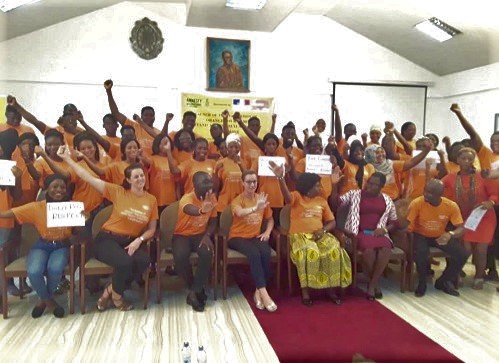
Amnesty Int. fights sexual harassment in universities
Amnesty International Ghana has started a campaign to end sexual harassment and violence on university campuses.
In line with the campaign, the organisation, in collaboration with the Australian High Commission and the French Embassy, has trained 75 students from some selected universities in Accra as part of efforts to find lasting solutions to the incidence of sexual harassment and sexual violence in their schools.
The students were from the University of Ghana, Legon, University of Professional Studies (UPSA), Ghana Institute of Journalism (GIJ), Accra Technical University and Achievers Ghana, a club that is promoting the habit of reading in the Nima Community, in Accra.
Actions
Speaking at the opening of the workshop for the selected students, the Campaigns and Fundraising Co-coordinator of Amnesty International Ghana, Mr Samuel Komla Agbotsey, said the campaign was part of activities to commemorate this year’s 16 days of activism and International Day Against Gender-based Violence.
The annual international campaign starts on November 25, which is the International Day for the Elimination of Violence Against Women, and ends on December 10, a day set aside by the United Nations as the Human Rights Day.
Globally, the theme is: “Orange the world: Generation equality stands against rape”, while the theme for the campus campaign is “orange your campus: stand against sexual abuse”.
Mr Agbotsey said the students would encourage victims of sexual harassment and violence to speak out and provide peer support for victims.
He said the aim of the campaign was to train more than 600 students to create awareness of sexual harassment and violence.
Additionally, it is to equip the students to expose perpetrators of sexual harassment and sexual violence on the various university campuses.
Economic coast
The Cooperation Attache at the French Embassy, Dr Marion Chapon, said a woman died in France from being beaten by her husband every three days.
“It affects all societies.
It is intolerable.
The President of France, Emmanuel Macron, has pledged to ensure gender equality and elimination of violence against women,” she said.
She said victims of sexual and gender based violence were usually silent and unwilling to share what they had experienced “because most of the time the abuser is a partner or a relative.”
The second Secretary in charge of Politics at the Australia High Commission, Ms Claire Maizonier, said sexual and gender based violence had huge economic impacts as it had ripple effects on the economy.
“It is a cost when women are not able to go to work because they have been abused. It has an impact on children and families,” she said.
She added that the High Commission was supporting the campaign because it was important for “both women and men to feel safe to pursue their education.”
Statistics
The Director of Amnesty International Ghana, Mr Robert Akoto Amoafo, said violence against women was a serious cause of death and incapacity among women of reproductive age.
“Here in the University of Ghana, we are aware of the on-going case of “Sex for Grades” which sparked various discussions on sexual violence against students by their lecturers, a known phenomenon which we all over looked until the release of the documentary by the BBC recently”, he said.
Mr Amoafo said “the United Nations (UN) reports that globally one out of three women and girls experiences physical or sexual violence in their lifetime, most frequently by an intimate partner.”
In Ghana, Mr Amoafo said a study released by the Ministry of Gender, Children and Social Protection showed that in 2015 27.7 per cent of women and 20 per cent of men experienced one form of domestic violence or another.
The study, he said, revealed that the incidence of domestic violence was generally lower among men than among women, with the most common form of domestic violence experienced by men being psychological violence.